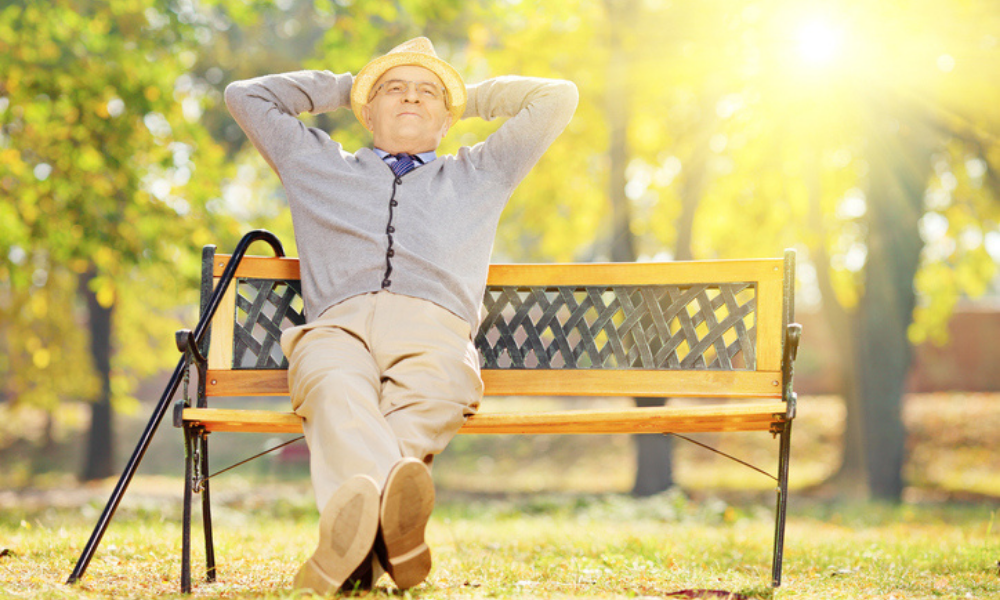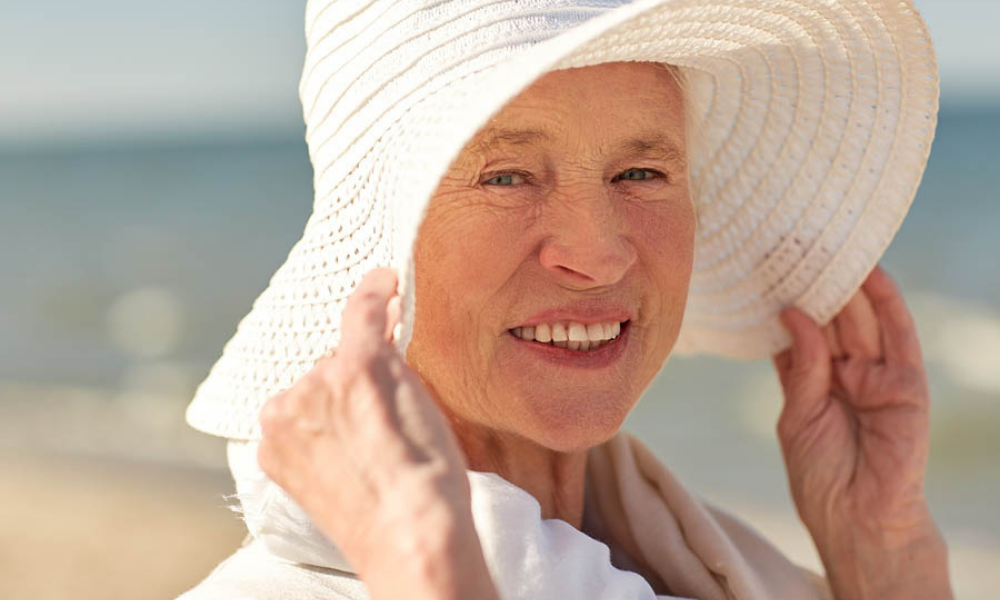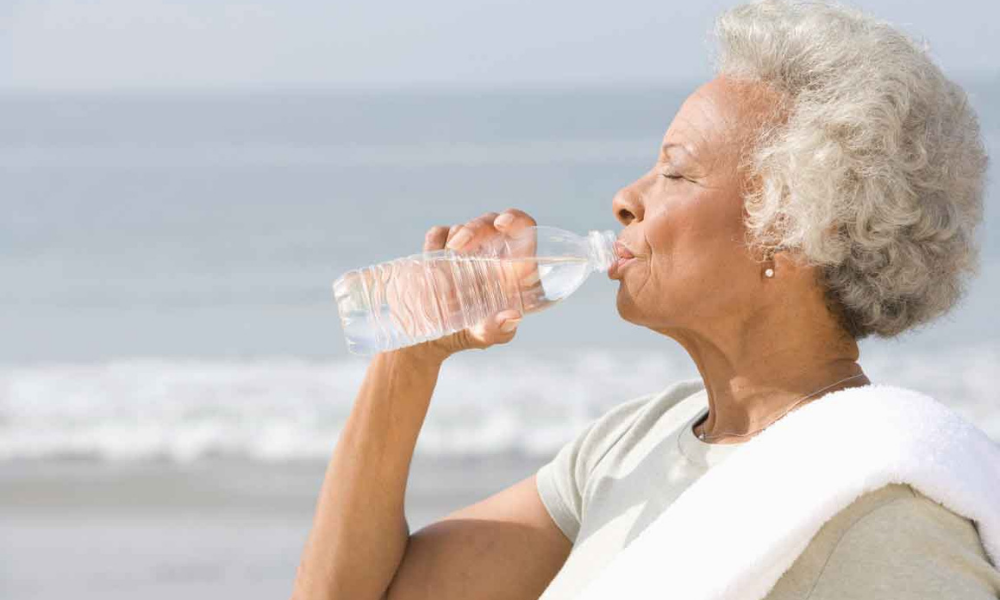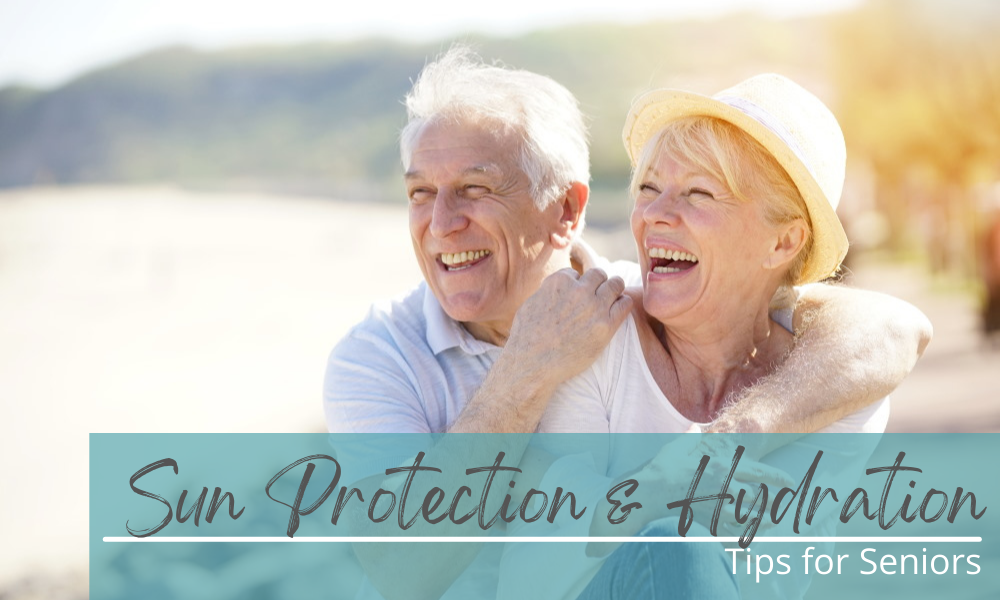Written by Lee-Anne Creery for American Standard Walk-in Tubs Canada
Ah, sunshine finally!

One of the most important things you can do is to get outdoors and enjoy the beautiful weather. But while you are taking a deep breath of fresh air and getting some much-needed Vitamin D, you’ll also need to practice proper hydration and sun protection, even in the Canadian winter & spring.
Here is what you should keep in mind.
While most people are itching to get outside and away from snow and COVID confinement, it’s important to remember that the sun’s UV rays are still powerful and can burn and easily damage older adult skin in a short period of time.

Sun Protection Tips
- Apply sunscreen (even in winter) with SPF 30+ one half hour before going outside
- Dress for the weather. It’s always best to layer clothing for warmth while it’s still chilly, and keep exposed skin covered.
- Wear a hat. Wide-brimmed is best to keep the top of your head covered, but also shade for your face and ears.
- Wear sunglasses. While you do receive Vitamin D through your unshielded eyes, 20% of cataracts are caused by extended UV exposure. Ensure that your sunglasses are full spectrum UV protection, which will also shade the glare from bright surfaces such as wet pavement, and snow & ice.
- Go outside in the morning before 10a or after 3p, when the sun is less harsh, and less damaging.
- The same tips apply if you choose to stay indoors and get your sunshine in front of a window.
- Know the warning signs of overheating. Seek shade on days of high heat and humidity, and prevent mental confusion and high heart rate caused by heat stress.
Statistics show that 32% of Canadians are Vitamin D deficient, rising to 40% in winter; Health Canada recommends that people over the age of 50 need to take a daily supplement of 600 IU-800 IU (15mcg-20mcg) in addition to the natural or fortified sources of foods.
Vitamin D deficiency can have a severe impact on your overall health, from bone maintenance to protecting against cardiovascular disease; colorectal cancer, and regulating the immune system.
Although you don’t need sunlight as part of your DRI for vitamin D, it sure does feel good after what seems like a long winter’s nap!
If getting some sun isn’t your thing to boost your mood when the days are still gray, and you start to feel the winter blues setting in, boost your spirits with aromatherapy and essential oils. Research shows that the components of certain oils can boost our mood, ease stress and help us to relax while supporting our mental health during winter blahs. Citrus helps to remind people of summer and may invoke positive emotions. What is your favourite aroma to help you feel good?
For Seniors, not drinking enough water can have serious consequences. Dehydration is a leading cause of hospital visits among older adults who feel pain & discomfort, confusion & dizziness, and fainting. Dehydration can lead to poor cardiovascular health, low blood pressure, blood clots, and painful kidney stones.

Hydration Tips
Water is the most important element to the human body. Water helps your heart pump blood to the necessary muscles, it lubricates your joints, helps your organs function properly, and helps your brain prepare for the decisions that you make.
- You MUST drink 6 to 8 cups (8oz each) of water per day as a minimum.
- The recommended Daily Activity Level is 150 minutes of moderate to vigorous exercise per week, so if you are an active adult, add 1 to 2 cups of water for every 30 minutes of exercise. According to this article by Reader’s Digest Canada, Dieticians recommend water intake differently for men and women.
- If you are thirsty, chances are, you are already becoming dehydrated, so be aware of dehydration warning signs: muscle cramps, fatigue, dizziness, headaches, chills, irritability, and dry mouth. Drink water immediately, or seek medical help.
Did you know that your fluid intake can also include food moistures?
Change your fluid sources, but remember that not all drinks are equally hydrating. Water can be consumed cold or hot with lemon, in forms of tea, sports drinks, popsicles, or fruits and vegetables. Apples, watermelon, celery and cucumbers have the highest water content.
But beware, make sure that you keep the sugar content/glycemic levels low. Drinks like sodas, beer/alcohol, hot chocolate, lemonade, sweetened iced tea, energy drinks, flavoured milk, and smoothies can work against you, causing dehydration.
So, if you want a healthier hydrating beverage next time you are thirsty, reach for a sports drink that is helpful for replenishing electrolytes, or a moisture-rich food.
Read more:
